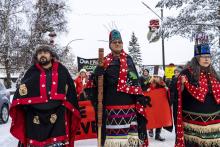The American Indian Studies Department is the home of American Indian and Indigenous knowledge at the University of Washington, and we acknowledge that we are on Coast Salish lands and waters. We are a community of faculty, students, staff, and local partners engaged in the interdisciplinary study of Indigenous peoples with the collective goal of fostering Indigenous wellness, political sovereignty, cultural revitalization, and cross-cultural understanding.
Our research, teaching, and service emerges from and engages with the histories, psychological and social realities, expressive cultures, traditional land-based practices, and political status of Indigenous peoples in the Pacific Northwest and beyond.
In light of recent events, we cannot continue our work without acknowledging what is occurring on Wet’suwet’en lands. AIS faculty, staff, and students stand in solidarity with and declare our support for the Wet’suwet’en people who have been acting with remarkable strength to defend their homelands from pipeline development and have been facing violent assaults from the Royal Canadian Mounted Police and industry for doing so. We demand that the Canadian government recognize Wet’suwet’en autonomy and uphold their right to sovereignty on unceded territory.
We ask that the destructive extractive work in Unist’ot’en territory by Coastal Gas Link immediately stop. We request that Canada and the provincial governments respect Indigenous rights as outlined in the Canadian Constitution, in countless court rulings, in the United Nations Declaration of the Rights of Indigenous people (UNDRIP), and in ‘Anuc niwh’it’en (Wet’suwet’en law).
Canadians have pledged to work towards reconciliation to try to heal the injustices perpetuated against Indigenous peoples—this healing must also include our sacred homelands and waters. To begin to heal these relationships, this kind of colonial violence and environmental injustice/racism must end.
To the Wet’suwet’en people, we stand beside you in this time of struggle, recognizing your courage and the sacrifices you have made as protectors of your territories. We will continue to work together in creating an environment where First Nations/Indigenous people and communities will thrive culturally, spiritually, socially, and politically.
Respectfully and in solidarity,
